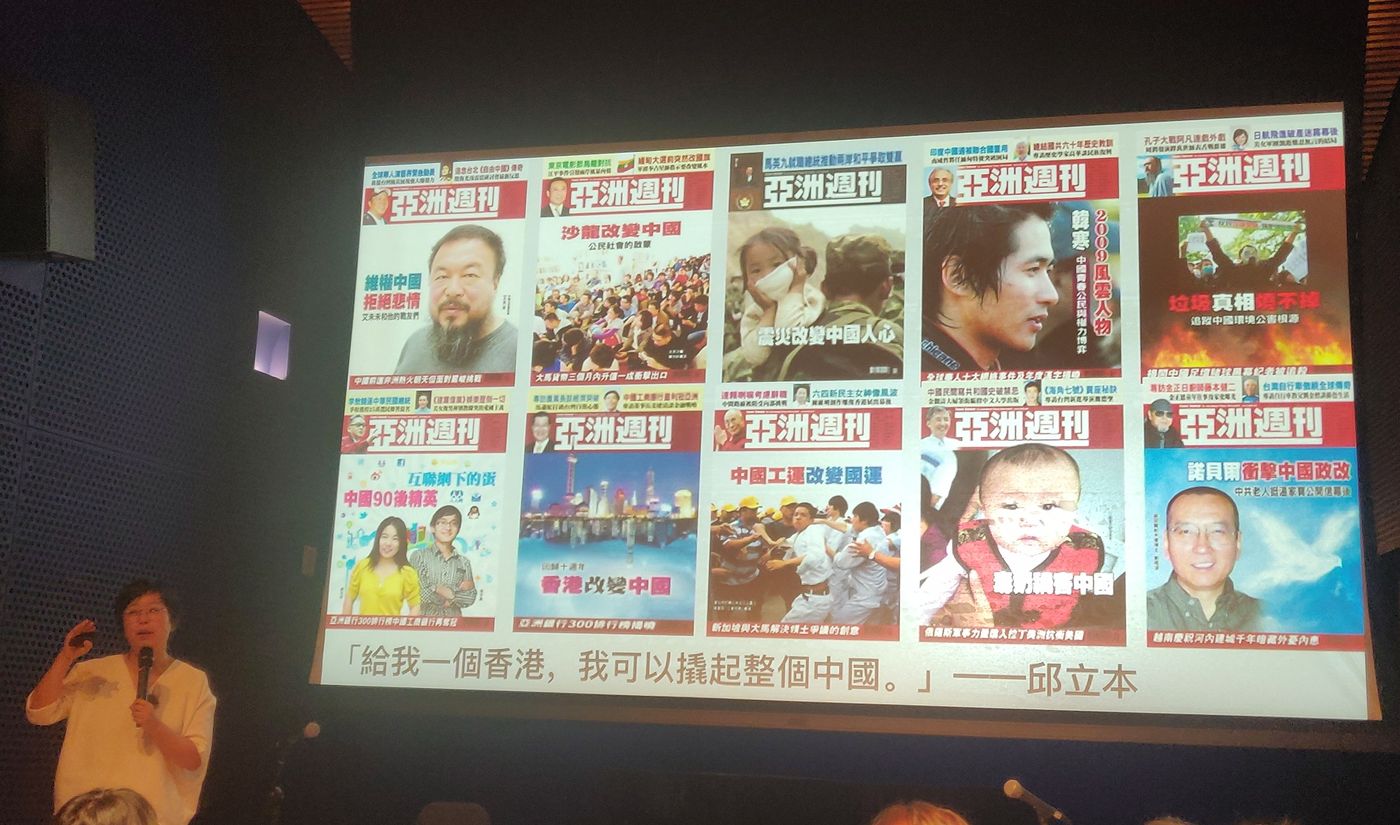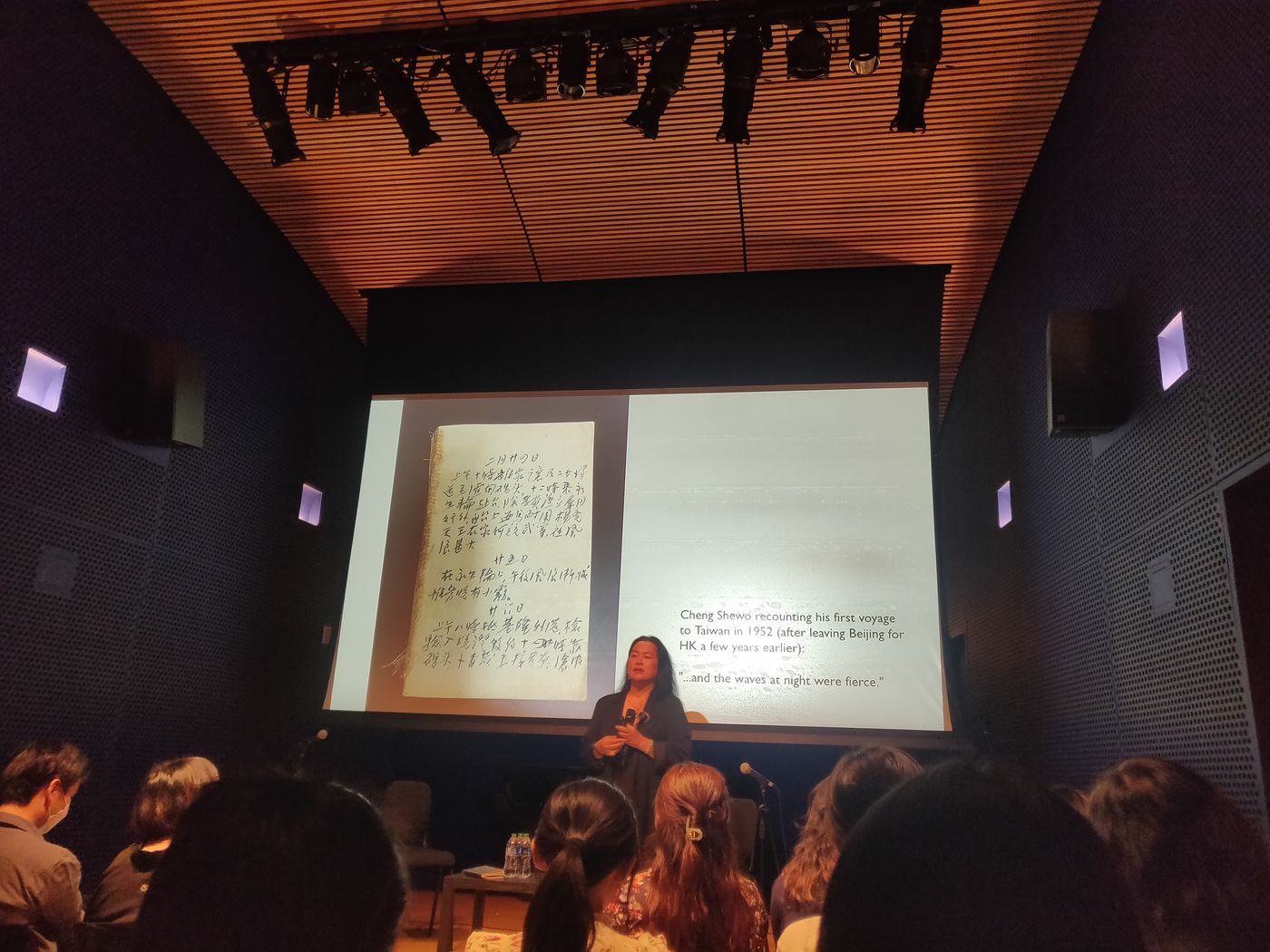
人类迷惑行为观察员
China is a culture that pretends to be a nation.
Cultural Salon
Today, I went to the "Life and Death Lecture of the "Global Chinese" era held by the New York Cultural Salon, and finally met the idol @张杰平 in person!

Jieping is very humorous, and the audience's laughter is also low. As a senior fan, I have already read her experience of writing the cover report of "Asia Weekly" during the honeymoon period in Hong Kong and China, witnessing the Hong Kong democracy movement, participating in the establishment of "Duan Media", founding Matt City, and now opening the "Enclave" bookstore; , and found a lot of wisdom in her oral expression.
Jieping is a practitioner. In the face of the great storms of the times, her way of coping is to do things. Write a report, run a magazine, put up a website, do a talk show... Once you've done it, go back and summarize it a little, and then move on. (Life is summed up, not planned. - Jie Pingyu)
The guest who came with her was Chengyin Zhou, an associate professor in the Department of Asian and Middle Eastern Studies at Duke University, specializing in East Asian studies. She followed the topic of Jieping and talked about Asian American in the United States (but the three stories she told: the early Chinese immigrant workers, the female worker who died in the Atlanta shooting last year, and her own stories are all Chinese American, not in a broad sense. Asian American).

Ms. Zhou's research is mainly on immigration, but she pays more attention to the impact of class inequality on immigration. Immigrants from the bottom labor class and immigrants from the elite class face different predicaments. However, the elites naturally have more voice, while the bottom workers are often ignored. The female worker killed in the Atlanta shooting was a smuggler from a poor fishing village in southern China. It was more than a week after she was killed that American police contacted her family. However, her brother was reluctant to accept her ashes, because she was a daughter who had left home and was unmarried, so there was no place for her ancestral grave .
As a country that has written the immigration system into the constitution, the only legislative exclusion since the founding of the United States is the passage of the Chinese Exclusion Act - don't rush to jump. The bill excludes Chinese workers , not businessmen, scholars, international students or tourists.
When Mr. Zhou Chengyin gave an example, he said that Chinese workers often went on strike, so they were excluded— in fact, he said the opposite . The reason Chinese workers are excluded is because they can usually endure extremely poor working conditions and extremely low pay, which drives down the wage level of the entire labor market, even the newly freed black workers can't stand it. In this state of working as slaves, Chinese workers can save all their money and send them to relatives in their hometown, instead of participating in the local economic circulation in the United States .
Misunderstanding and dissatisfaction slowly built up among the other workers, until there was a complete outburst. It was on a railway laying site, and the conditions were very harsh. Several foremen of different ethnicities discussed using a strike to improve workers' treatment, and the Chinese foreman also expressed his opinion. As a result, the Chinese foreman turned around and told the boss about the strike plan of the other foreman. ("I made a report with my backhand" - I have been mixed in Jianzhong online, is this tune familiar?)
The promoters of the Chinese Exclusion Act are the Workerman's Party and its leaders. This act took effect in 1882, and it was not lifted under the pressure of the ROC until after Pearl Harbor in 1943, when the United States declared war on Japan and then formed an alliance with the Republic of China.
Who are the Chinese?
The sharing of the two guests stimulated the imagination of everyone present. The audience was very active in the question and answer session, and the questions were mainly focused on the doubts about the identity of "Chinese".
In fact, there are doubts on the contrary. Because the concept of "Chinese" was created for political needs.
Jie Pingyu: China is a concept that has only existed in the past 100 years. Wasn't it called "world" before? Under the whole world, is it not the emperor's land.
In the past, there were only Han, Manchu, Mongolian, Tubo, Hu, Semu... Where did the "Chinese" come from?
Zhou Chengyin: American identity politics is a political need. Of course, we know that Asian American includes many ethnic groups, and even if it is Chinese American, your class is different, and your demands are also different. But when we need a voice in mainstream American society, we need to unite Black Life Matters and Hispanic Activism activists in the name of Asian American to advance racial equality.
Identity itself doesn't make sense. Only when we face the other can we define.
At the salon, Jieping said several times: China is a time of progress. And the last sentence I read has been circling in my head:
China is a culture that pretends to be a nation. ——Lucian Pye, American political scientist
Obviously, the concept of "Chinese" was constructed for the existence of "China". And how does it count as a nation?
Zhang Xun, a famous official of the Tang Dynasty, was smart and upright. He defended Suiyang in the An-Shi Rebellion. He did everything he could, but the reinforcements were delayed. Thirty thousand people were cannibalized in the city one after another, until the city was destroyed and the entire army was destroyed. His stubborn defense consumed the enemy's combat power, delayed the Tang army, and finally saved the Tang Dynasty. The history books of various dynasties regard Zhang Xun as a patriotic hero.
But what country does he love?
The emperor can appoint traitors, kill good generals, and make countless stupid decisions but no one can supervise; when the rebels invade Chang'an, the emperor himself goes to Sichuan to take refuge, and then his son rebels and proclaims himself king, and he also watches you in Yongqiu and Suiyang. Defending for two years without any assistance... What is there to "hold" in such a country? Why would you drag 30,000 women, children, and children to be buried with you—and still be eaten by you?
Every time I revisit this history, I feel horrified. What kind of spiritual power is it that makes people loyal to this level? And those innocent civilians who were eaten have nowhere to escape.
What's even more frightening is that even though this happened more than a thousand years ago, reading it today, you can actually find the corresponding roles in society: the unsupervised power core, the clever and righteous courtier who swears allegiance to the death, and they are sucked and drained because of unknown reasons. civilians...
Hillside Sheep·Tong cares about the ancients -【元】Zhang Yanghao
The peaks and mountains are like gatherings, the waves are like fury, and the mountains and rivers are like Tongguan Road.
Looking at the Western Capital, I hesitated.
Sad that Qin and Han traveled through the place, all the palaces and houses were made soil.
Prosperity, the people suffer; death, the people suffer!
What does the demise of globalization mean?
When the Berlin Wall fell, Germany celebrated. Although East Germany has been occupied by the Soviet Union for nearly 40 years, its economy and culture have lagged far behind that of West Germany, but after all, the overall education level of Germany before the war was very high, and the basic quality of the people was still there. After ten years of hard work, the differences between East and West Germany It will eventually fade away.
When the Korean peninsula was divided, the North and the South were both poor and white, and the illiteracy rate was high. It is only in the past three decades that South Korea has popularized higher education and achieved economic growth. In terms of national strength, South Korea beat North Korea. But neither the United States nor South Korea wants to mess with North Korea. In addition to the consideration of nuclear weapons and China's participation in the war, more importantly, even if the Kim dynasty breaks down, South Korea does not want to take over North Korea. With North Korea's current population quality and infrastructure level, if they are included in South Korea's political map, South Korea will need to invest a lot of capital in education and infrastructure in North Korea, and its economic level will be set back decades - and may be trapped in China and Japan as a result. 's pinch.
What about China? Capital elites outflow, knowledge elites outflow, what will be left? Where will China's current population of one billion go?
The demise of civilization may not be the death of everyone on Judgment Day, as described in the Bible, but the decivilization of civilization. The variety of goods in supermarkets is gradually decreasing. Slowly you can no longer buy products from overseas. Pirates, and even state sponsored pirates, will be re-active in international waters logistics channels.
Jieping often mentioned that he went to Hong Kong to study in 2005, and when he came out to work, he was in the honeymoon period between Hong Kong and China. I originally thought that the state of the honeymoon period was the future. The world would become more and more open, everything would get better and better, and we could all be people of the global village, but I didn’t expect that I was just lucky and just happened to grow up in a spring. I went abroad to study in 2006, and I was the same age as Jieping. The kind of feeling she said about looking back and realizing it was a fluke, I feel the same way. Just because I'm not a liberal arts student😅, and I didn't stay in the greater China region in those years, I realized that the cold winter has come after several rounds of the Sino-US trade war and finally ushered in the Wuhan pneumonia.
By the time I began to face the confusion of the changing times, Jieping had already left many traces of thinking. She has always liked to say "live out the contradictions of the times", and in the face of high-pressure censorship, insisting on "getting back your own language", like a bright light in the dark night, gave me a lot of strength.
When she saw Jieping this time, she said that she had moved out of Hong Kong and now lives in Taiwan. It may take some time before Taiwan can formulate an effective immigration policy. If it's a chat-like occasion with friends, I would like to ask her, is it easy to live in Taiwan? How is your family? What are your plans if your parents are in the country? Is it risky to return home to visit relatives? I don't need an answer either, just like I would chat with other friends about this, talk about it, and in the end, I can only take one step at a time.
Jieping is a practitioner. So in fact, there is no need to say more, I believe she will not have too much trouble.
The important thing is to do things.
please take care.
appendix:
- Prisoners of Geography: Ten Maps That Tell You Everything You Need to Know About Global Politics
- The End of the World Is Just the Beginning: Mapping the Collapse of Globalization
Like my work?
Don't forget to support or like, so I know you are with me..
Comment…